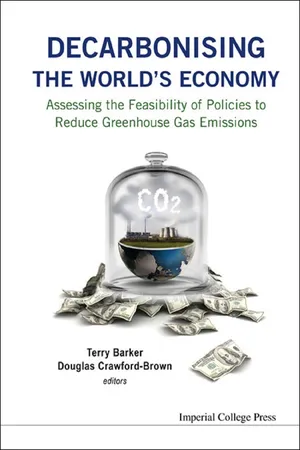
Decarbonising The World's Economy: Assessing The Feasibility Of Policies To Reduce Greenhouse Gas Emissions
Assessing the Feasibility of Policies to Reduce Greenhouse Gas Emissions
- 376 pages
- English
- ePUB (mobile friendly)
- Available on iOS & Android
Decarbonising The World's Economy: Assessing The Feasibility Of Policies To Reduce Greenhouse Gas Emissions
Assessing the Feasibility of Policies to Reduce Greenhouse Gas Emissions
About this book
Too often amongst policy makers and thought leaders an assumption is made that we must make a choice between tackling climate change and having a strong economy; tackling climate change and allowing poorer nations to develop; tackling climate change and having a secure energy system. However, a decade of advanced modelling tested against historical data has provided wide evidence that well-chosen policies can be implemented that avoid these apparent either/or choices.
This highly interdisciplinary book provides an overview of potential pathways for the decarbonisation of the global economy. By examining the entire global economy, we show policy-makers and thought-leaders that greatly reducing the risks of climate change can be consistent with energy security, economic development in poor nations, and vibrant economies in already developed nations. Advanced models of the relationships between the economy, energy and climate change pioneered at the Cambridge Centre for Climate Change Mitigation Research (4CMR) over the past decade provides a sound evidence base for decisions. This book examines not only the impacts of policies, but also the feasibility of bringing them forward and the ways in which energy, climate and economic policies can and must be joined up if climate, energy and economic goals are to be met globally.
Economists, physicists, engineers, policy analysts, environmental scientists, climate scientists, political analysts, lawyers and computational scientists are brought together for the first time to produce analyses that make up a unique approach to a global problem that must be addressed sooner rather than later.
Contents:
- Introduction (Terry Barker)
- The Case for Decarbonisation (Douglas Crawford-Brown and Martin Sewell)
- Policies and Measures for Mitigating Climate Change (Paul Haynes and Yongfu Huang)
- Scenario Design for a Global Low-carbon Economy (Jun Li and Aleix Altimiras-Martin)
- Modelling Decarbonisation Scenarios (Annela Anger, Terry Barker and Mark Syddall)
- The Economic Feasibility of Policies for Decarbonisation (Terry Barker, Annela Anger and Hector Pollitt)
- Feasibility of Decarbonisation from a Technology Perspective (J-F Mercure and Pablo Salas)
- Feasibility of Reducing Emissions by End-use Sector (Scott Kelly, Andrew Skelton and Aleix Altimiras-Martin)
- From Theory to Practice: Climate Policy and Political Feasibility (Sonja Klinsky and Michael Grubb)
- Co-impacts of a Decarbonised Economy (Douglas Crawford-Brown and Ann Thompson)
- Conclusions (Terry Barker)
Readership: Academics and policy makers interested in forming policies that target energy, climate and economic issues.
Key Features:
- Conclusions are based on a decade of developing some of the most advanced models of links between energy, economic and environmental issues
- Examines the entire global economy, showing how policies and actions in any one nation influence behaviours in other nations
- Highly interdisciplinary content, with analyses produced by economists, physicists, engineers, policy analysts, environmental scientists, climate scientists, political analysts, lawyers and computational scientists
Frequently asked questions
- Essential is ideal for learners and professionals who enjoy exploring a wide range of subjects. Access the Essential Library with 800,000+ trusted titles and best-sellers across business, personal growth, and the humanities. Includes unlimited reading time and Standard Read Aloud voice.
- Complete: Perfect for advanced learners and researchers needing full, unrestricted access. Unlock 1.4M+ books across hundreds of subjects, including academic and specialized titles. The Complete Plan also includes advanced features like Premium Read Aloud and Research Assistant.
Please note we cannot support devices running on iOS 13 and Android 7 or earlier. Learn more about using the app.
Information
Table of contents
- Cover
- Half Title
- Title Page
- Copyright
- Contents
- Introduction
- Chapter 1. The Case for Decarbonisation
- Chapter 2. Policies and Measures for Mitigating Climate Change
- Chapter 3. Scenario Design for a Global Low-carbon Economy
- Chapter 4. Modelling Decarbonisation Scenarios
- Chapter 5. The Economic Feasibility of Policies for Decarbonisation
- Chapter 6. Feasibility of Decarbonisation from a Technology Perspective
- Chapter 7. Feasibility of Reducing Emissions by End-use Sector
- Chapter 8. From Theory to Practice: Climate Policy and Political Feasibility
- Chapter 9. Co-impacts of a Decarbonised Economy
- Chapter 10. Conclusions
- Index